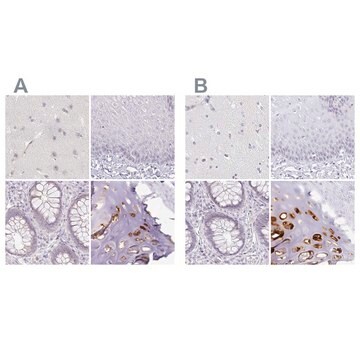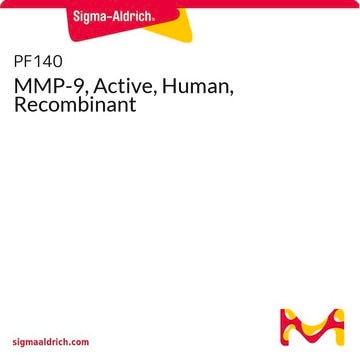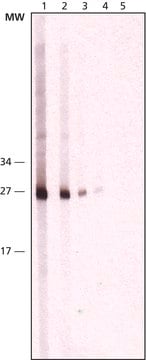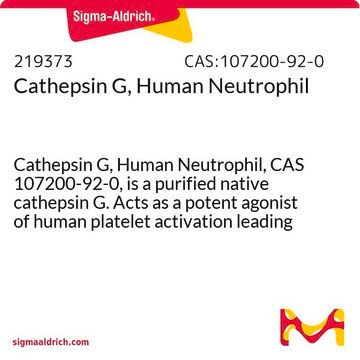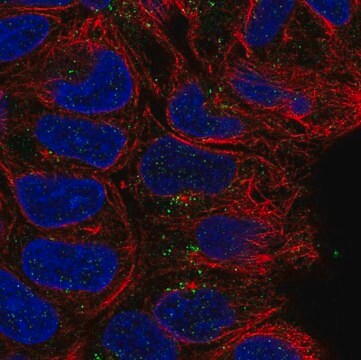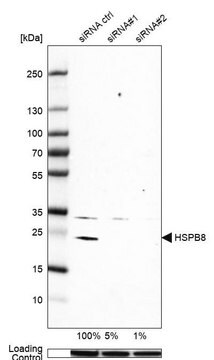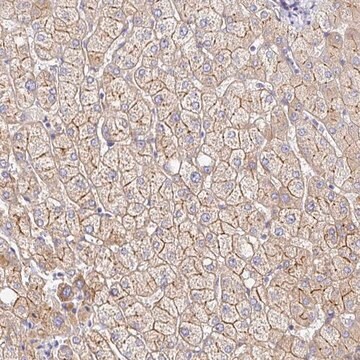The concentration of this antibody is typically 0.5 mg/mL. The lot specific value is reported in the Certificate of Analysis. Please see the link below to review a sample or lot specific Certificate:
https://www.sigmaaldrich.com/product/sigma/wh0001513m1#product-documentation
WH0001513M1
Monoclonal Anti-CTSK antibody produced in mouse
clone 2F1, purified immunoglobulin, buffered aqueous solution
Sinonimo/i:
Anti-CTS02, Anti-CTSO, Anti-CTSO1, Anti-CTSO2, Anti-MGC23107, Anti-PKND, Anti-PYCD, Anti-cathepsin K (pycnodysostosis)
Scegli un formato
416,00 €
Scegli un formato
About This Item
416,00 €
Prodotti consigliati
Origine biologica
mouse
Livello qualitativo
Coniugato
unconjugated
Forma dell’anticorpo
purified immunoglobulin
Tipo di anticorpo
primary antibodies
Clone
2F1, monoclonal
Stato
buffered aqueous solution
Reattività contro le specie
human
tecniche
indirect ELISA: suitable
western blot: 1-5 μg/mL
Isotipo
IgG2aκ
N° accesso Genebanck
N° accesso UniProt
Condizioni di spedizione
dry ice
Temperatura di conservazione
−20°C
modifica post-traduzionali bersaglio
unmodified
Informazioni sul gene
human ... CTSK(1513)
Categorie correlate
Descrizione generale
Immunogeno
Sequence
KCRGYREIPEGNEKALKRAVARVGPVSVAIDASLTSFQFYSKGVYYDESCNSDNLNHAVLAVGYGIQKGNKHWIIKNSWGENWGNKGYILMARNKNNACGIANLASFPKM
Azioni biochim/fisiol
Stato fisico
Note legali
Esclusione di responsabilità
Non trovi il prodotto giusto?
Prova il nostro Motore di ricerca dei prodotti.
Codice della classe di stoccaggio
10 - Combustible liquids
Punto d’infiammabilità (°F)
Not applicable
Punto d’infiammabilità (°C)
Not applicable
Dispositivi di protezione individuale
Eyeshields, Gloves, multi-purpose combination respirator cartridge (US)
Scegli una delle versioni più recenti:
Certificati d'analisi (COA)
Non trovi la versione di tuo interesse?
Se hai bisogno di una versione specifica, puoi cercare il certificato tramite il numero di lotto.
Possiedi già questo prodotto?
I documenti relativi ai prodotti acquistati recentemente sono disponibili nell’Archivio dei documenti.
-
The antibody is in a buffered aqueous solution and one vial is 100ug, but what is the concentration and volume?
1 risposta-
Utile?
-
Filtri attivi
Il team dei nostri ricercatori vanta grande esperienza in tutte le aree della ricerca quali Life Science, scienza dei materiali, sintesi chimica, cromatografia, discipline analitiche, ecc..
Contatta l'Assistenza Tecnica.

